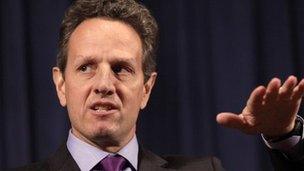Timothy Geithner's Grand tour
- Published
- comments

Geithner's tour suggests a heavy US involvement
When I was based in Europe travelling to this capital or that, I would get used to seeing groups of slightly bewildered American tourists being frog-marched around the seminal sights of one ancient capital before being whisked away to the next country, the next capital.
Hang on to your hats, if it's Tuesday, it must be Paris.
The US Treasury Secretary Tim Geithner is doing his own version of the modern Grand Tour this week.
His diary looks like this: Tuesday morning - Frankfurt, European Central Bank's president. Tuesday afternoon - Berlin, German finance minister. Wednesday - Paris, President Nicolas Sarkozy. Wednesday afternoon - Marseille, new Spanish Prime Minister Mariano Rajoy. Thursday - Milan, Italian prime minister. Home for the weekend.
The only wonder is he's not going to the big summit itself. This is by any standards a very deep involvement in Europe's affairs by an American politician. It is the sort of tour of capitals that you usually only see on the eve of war.
I suspect when the history of this crisis is written, we'll see that the White House has played a rather big role. It is hardly surprising, given what's at stake. But is President Barack Obama prepared to do anything beyond exhortation and advice?
White House worried
The very fact Mr Geithner is doing all this is a deliberate signal. It suggests that the White House is still worried that the eurozone countries won't do enough, and need to be kept up to the mark (or perhaps from returning to it).
President Obama constantly tells the American public that the biggest danger to the American economy is "headwinds" from Europe., external Mark Dow, from Pharo management, says the danger to the US from a European meltdown is not from trade but what he calls "emotional contagion" through the financial markets. He says he hopes that Geithner receives a better reception that when he turned up to a European finance ministers' meeting in Poland and was rather given the cold shoulder, external. He says the US treasury secretary has "battlefield experience" and that some smaller countries may find ideas easier to swallow when they are proposed by outsiders, than by France and Germany.
The trip is also a way of keeping a close eye on what's going on, and perhaps what's going wrong. Geithner is likely to get part of what he wants. Now Germany has got the assurances that all the eurozone countries will stick to the rules or face punishment, external, it may be more inclined to allow the European Central Bank to come to the rescue, external of those in trouble.
It is less certain what the US treasury secretary will say about the role of the International Monetary Fund. There have been been rumours , externalthat America will dig into its pockets to help out. Some think that Geithner has his present ready and will play Santa, external before the week is out.
But Thomas Kliene-Brockhoff of the German Marshall Foundation of the United States is less certain. He doesn't see signs of movement although he thinks it would be in America's interests. He told me it is in America's tactical interest to help fund a rescue plan to prevent a recession, and in its strategic interest not to be Europe's "white knight", rather than allow the Brics [Brazil, Russia, India and China] to ride to their rescue. He says America is now echoing the very faults it has been pointing out in the European Union: "Too timid, too slow, not courageous enough."
If that is the case, Obama's timidity is easy to understand. Many Americans are already angry that the American central bank bailed out American banks, without adding a bail-out for European banks to the charge sheet, too.